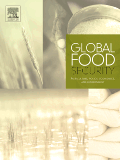Sustainable Food Systems
Call for papers - Global Food Security Journal

Call for papers is on Sustainable Food Systems and Diets - Deadline: 1 June 2019
The Global Food Security Journal is calling for papers on sustainable diets and food systems to help further the discussions and debate. Manuscript submissions could include sub-topics that cut across multiple spatial and time scales from global to local, that involve multiple demographic populations living in different environments (i.e. urban or rural), and that highlight multiple entry points across food systems (i.e. the middle of the value chain). Issues of equity, gender, economics, and behavioral economics, which the Commission report did not cover, will be considered.
Manuscript ideas or abstracts can be submitted to Editor-in-Chief, Jess Fanzo at jfanzo1@jhu.edu. Manuscripts should be a maximum of 4,000 words and should be framed as state-of-the-art reviews, perspectives opinions and debates that synthesize, extend or critique the potential of the achieving sustainable diets and food systems.
Call for Papers on “new technologies for food security and nutrition in the 21st century” - Deadline: 1 August 2019
Manuscript submissions should include the exploration, use, benefits and potential challenges of game-changing technologies that will transform food supply chains, consumer access to food, and even, utilization of foods across a range of high-, middle- and low-income countries. Technologies and innovation could cover artificial intelligence and machine learning, robotics, intelligent sensors, digital agriculture and nutrition tools, plant and nutri genomics (i.e. personalized nutrition), food tracking and tracing technologies, vertical farming and “agritechture,” bioeconomy, consumer apps and technology in improving access including acceptance, distribution, and shopping (ie walk in walk out technology and driver-less technology), smart phone food image recognition, microbiomics (soils, crops, animals and humans), and lab grown meats and alternative proteins to name just a few.
Manuscript ideas or abstracts can be submitted to Editor-in-Chief, Jess Fanzo at jfanzo1@jhu.edu. Manuscripts should be a maximum of 4,000 words, and should be framed as state of the art reviews of the new technology or perspectives opinions and debates that synthesize, extend or critique the potential of the technologies.





